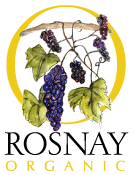Nurture your Body, Mind and Spirit
5 January, 2013
Regardless of the arguments of the corporate seed and chemical companies and their friends in government, Australia’s growing numbers of organic farms are living proof that chemicals and genetic engineering are not necessary.
More and more modern illnesses are being attributed to chemicals in our food and water. Even in wine, it is hard to believe that simply fermenting grapes magically removes the chemical residues. In fact, it is quite plausible that metabolic processes such as fermentation and digestion can alter the toxicity of chemicals, and combinations of chemicals, in ways which are poorly understood.
These are some of the key benefits of organic food and wine:
1. More anti-oxidants: “Resverotrol, a compound found in red grapes, has been shown to be beneficial to health by lowering cholesterol and preventing cell oxidation, an important process in the prevention of cancer. Researchers have found that grapes sprayed with fungicides commonly used on conventional vineyards had 80% less resverotrol. Resverotrol occurs in grapes as a defense compound produced in a process known as systemic acquired resistance (SAR). SAR in plants produces many types of defense compounds and is induced by low to medium levels of pathogen and insect attack. It goes without saying that organically grown crops would have SAR induction occurring on a regular basis, since organic farmers do not, for the most part, use eradication as an approach to pest management and commonly have low levels of pests as part of their overall equilibrium. There is evidence for this increased SAR, such as the recent finding that soups made from organic ingredients contain higher levels of salicylic acid (an important component of the SAR process) than the same soup made from conventionally grown vegetables.”
Baxter, G. J. et. al. 2001. Salicylic acid in soups prepared from organically and non-organically grown vegetables. European Journal of Nutrition, 40:289-292.
2. More vitamins and minerals: “Organic crops contained significantly more vitamin C, iron, magnesium, and phosphorus and significantly less nitrates than conventional crops. There were nonsignificant trends showing less protein but of a better quality and a higher content of nutritionally significant minerals with lower amounts of some heavy metals in organic crops compared to conventional ones… Conclusion: There appear to be genuine differences in the nutrient content of organic and conventional crops.”
Quoted from the abstract of: “Nutritional Quality of Organic Versus Conventional Fruits, Vegetables, and Grains”, Journal of Alternative and Complimentary Medicine, Volume 7, Number 2, 2001, pp. 161–173, by Mary Ann Liebert
3. “Truer”, and better wines: Jean-Marc Carité, winemaker and editor of the French “Vin Bio” magazine, sums up the situation here:
“Organic wines are not more expensive to buy, but they are more expensive to produce. The problem is that consumers of organic foods are not great consumers of wine, whilst the traditional consumers of wine do not want to pay more than for a conventional wine. If organic wine production has increased, it is because the producers have realised that they could make better wine. They are also conscious of the need to protect the environment”.
4. Lower sulfur levels: Many people now realise that organic and preservative free wines are not one and the same thing. Whilst grown naturally, in most countries, organic wine is permitted to have about half the normal amount if sulfur added in order to protect the wine.
Sulfur is generally regarded as essential for wine quality, and to quote James Halliday, “depending on a wine’s pH, between 13ppm and 60ppm of free sulfur are required to control microbial growth… These levels are quite low by overall food standards” (The Art and Science of Wine). Sulfur takes many forms and is essential to our bodies, according to nutritionists:
“Part of the chemical structure of several amino acids, sulfur aids in many biochemical processes. It helps protect the body from infection, blocks the harmful effects of radiation and pollution and slows down the ageing process. Sulfur-containing proteins are the building blocks of cell membranes, and sulfur is a major component of the gel-like connective tissue in cartilage and skin. Sulphur is found in cruciferous vegetables, eggs, milk and animal products.” (Sally Fallon, Nourishing Traditions, 2001).
In line with adding less and less sulfur, in 2012 Rosnay for the first time produced a Preservative Free red wine, made without any added sulfur. It is made by French winemaker Chris Derrez, with minimal handling, careful oxygen exclusion, just a touch of oak for softness and early bottling.
